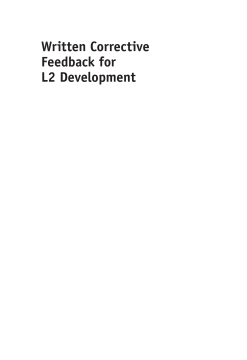
Additional Information
Book Details
Abstract
Written corrective feedback (CF) is a written response to a linguistic error that has been made in the writing of a text by a second language (L2) learner. This book aims to further our understanding of whether or not written CF has the potential to facilitate L2 development over time. Chapters draw on cognitive and sociocultural theoretical perspectives and review empirical research to determine whether or not, and the extent to which, written CF has been found to assist L2 development. Cognitive processing conditions are considered in the examination of its effectiveness, as well as context-related and individual learner factors or variables that have been hypothesised and shown to facilitate or impede the effectiveness of written CF for L2 development.
This volume is a welcome addition to the literature on the always interesting and controversial issue of written corrective feedback in second language acquisition. It carefully defines terms and then provides a current, thorough, and coherent look at the cognitive and sociocultural theories that should guide the research and practice of written CF.
John Bitchener is Professor of Applied Linguistics at AUT University, New Zealand. His research interests focus on second language learning and teaching; theoretical and empirical issues regarding the role of written corrective feedback for L2 development; factors (individual internal and external) that facilitate and impede second language learning; feedback to thesis and dissertation students; and the discourse of academic genres.
Neomy Storch is Senior Lecturer in Applied Linguistics and ESL at the School of Languages and Linguistics, The University of Melbourne, Australia. Her research interests include second language learning and teaching, second language writing, collaborative writing, L2 writing development, written corrective feedback from a sociocultural perspective, peer interaction and the development of authorial identity in graduate writing.
“Written Corrective Feedback for L2 Development” gives a comprehensive picture of theories and empirical studies on how written CF possibly contribute to L2 development. This volume is invaluable for both novice and experienced L2 writing researchers, who seek theoretical foundations of written CF and empirical evidence of effective implementation of written CF in the classroom. The authors clearly define key concepts, introduce two main complementary, but not mutually exclusive, approaches for written CF, critically review relevant studies from cognitive and sociocultural perspectives and suggest future research directions.
Jungmin Lim, Michigan State University, USA
This valuable book advances our understanding of what is known and remains to be known about the language learning potential of written corrective feedback (WCF). By bringing together cognitive and sociocultural theoretical and empirical perspectives, it succeeds in underscoring what each one has contributed (and can and cannot contribute) to answering the relevant questions in the field. Future researchers interested in the potential of WCF to facilitate L2 development will keep returning to this book for insights on the theoretical and methodological foundations of their research endeavours.
John Bitchener and Neomy Storch address fundamental issues related to corrective written feedback and L2 development. Importantly, they examine relevant research within two different theoretical paradigms: cognitive and sociocultural theory of mind. For teachers and researchers, this book provides new insights, enriching our knowledge of effective pedagogical practices.
John Bitchener and Neomy Storch have done an outstanding job of situating written feedback within two dominant theoretical frameworks, demonstrating that the cognitive and sociocultural approaches are complementary rather than competing with each other, offering a thorough but at the same time critical synthesis of exciting studies and, most importantly perhaps, charting the course for future research on written CF, emphasizing the necessity of illuminating how and why it promotes L2 development or fails to do so under certain circumstances.
Mirosław Pawlak, Adam Mickiewicz University, Poland
This volume makes a valuable contribution to the field of WCF. One of the strengths is that the authors not only point out important issues in numerous studies, including their limitations and useful results, but they also make a clear divide between basic concepts in cognitive and sociocultural theories, which may be useful for graduate students, novice researchers, and teacher educators.
Liivi Jakobson, University of Gothenburg, Sweden
Table of Contents
| Section Title | Page | Action | Price |
|---|---|---|---|
| Contents | v | ||
| Acknowledgements | vii | ||
| 1 Introduction | 1 | ||
| 2 The Cognitive Perspective on Written CF for L2 Development | 10 | ||
| 3 Cognitively Informed Research on Written CF for L2 Development | 34 | ||
| 4 The Sociocultural Perspective on Written CF for L2 Development | 67 | ||
| 5 Socioculturally Informed Research on Written CF for L2 Development | 87 | ||
| 6 Conclusion | 120 | ||
| References | 137 | ||
| Index | 149 |
